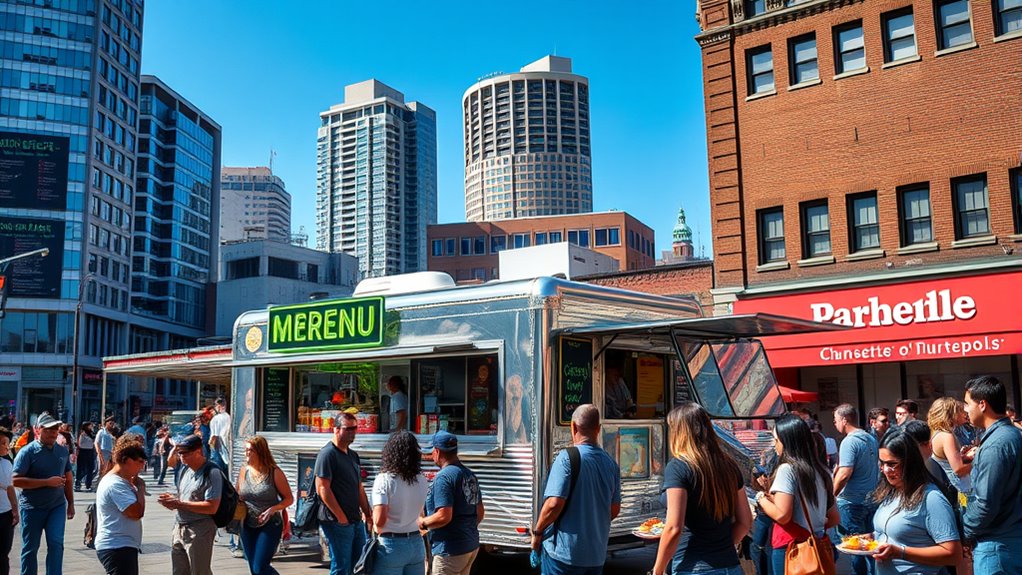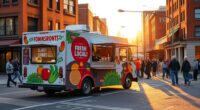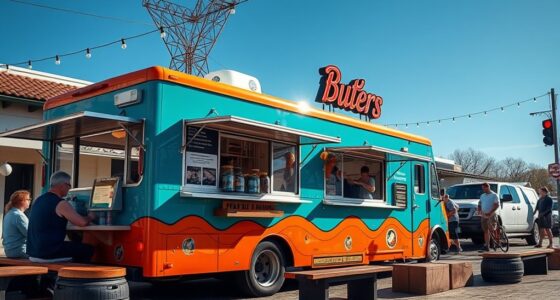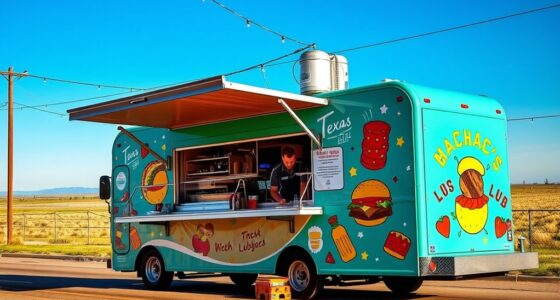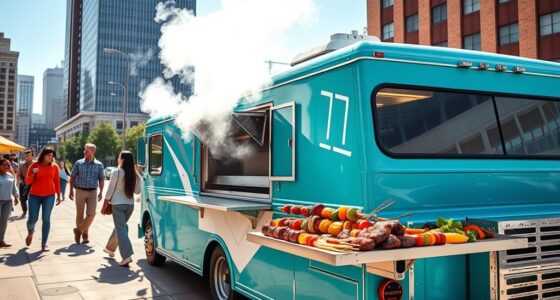To start a food truck in Minneapolis, you need a solid business plan that includes branding, menu ideas, and marketing strategies. You’ll also need to acquire permits, licenses, and meet health and safety regulations by managing city portals. Budget carefully for truck costs, equipment, and supplies, and explore local grants for support. Focus on unique menu offerings and active promotion through social media. Keep learning about the process to successfully launch and grow your food truck business.
Key Takeaways
- Develop a detailed business plan, branding, and marketing strategy tailored to Minneapolis’s local preferences and target audience.
- Obtain necessary permits and licenses from Minneapolis health and city authorities, including health, vending, and parking permits.
- Secure a suitable, compliant food truck and equip it with essential appliances, ensuring adherence to health and safety standards.
- Budget for initial costs, including truck purchase, customization, permits, insurance, ingredients, and marketing expenses.
- Leverage local networking, community events, and social media to build customer loyalty and maximize visibility in the Minneapolis food scene.
Starting With a Business Plan
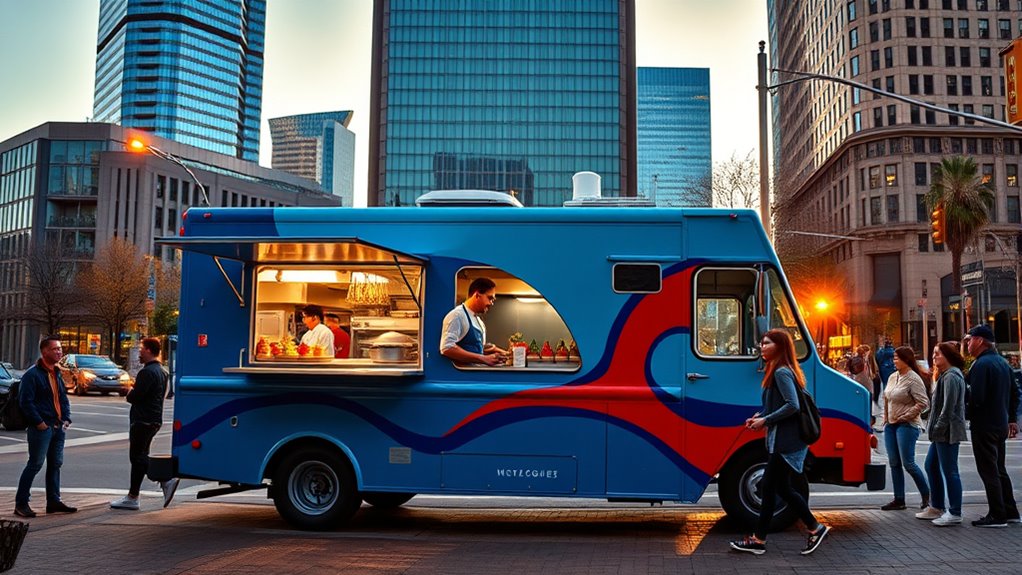
Before launching your food truck in Minneapolis, it’s essential to create a solid business plan. A well-thought-out plan guides your journey and sets you apart through effective food truck branding. Focus on defining your unique identity early—consider logos, truck design, and menu themes that resonate locally. Incorporate social media marketing into your strategy to build buzz before opening. Use platforms like Instagram and Facebook to share your progress, menu previews, and upcoming events, engaging potential customers. A clear business plan helps you allocate resources, set realistic goals, and understand your target market. It also guarantees consistency in your branding efforts and marketing messages. With a strong plan, you’ll be ready to attract loyal customers and stand out in Minneapolis’s vibrant food scene.
Understanding Local Requirements
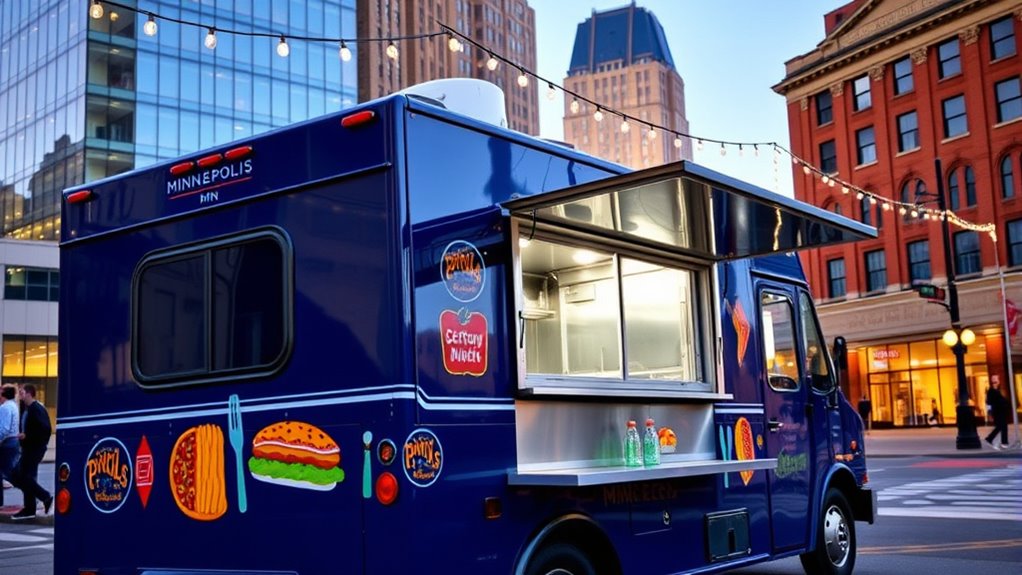
To get started, you’ll want to explore Minneapolis’s online permit application portals to streamline your process. Make sure you understand sanitation protocols and inspection tips to stay compliant, and familiarize yourself with designated street vending zones to find the best spots. Being aware of these local requirements helps you operate smoothly and avoid unexpected setbacks. Additionally, understanding local health regulations related to food trucks can help ensure your compliance with licensing and safety standards.
Online Permit Application Portals
Are you aware of how to navigate Minneapolis’s online permit application portals for food trucks? This step is vital to ensure you comply with local regulations and get your business up and running smoothly. The city’s portals provide clear instructions for submitting permits related to food truck branding, health, and safety requirements. Familiarize yourself with the application process early, as delays can affect your launch date. Use the portal to upload necessary documents and track your application status. While handling permits, don’t forget to leverage social media marketing to build your brand presence. Showing your food truck’s unique identity online attracts customers and boosts visibility. Being proactive with these online portals streamlines your permit process and sets a solid foundation for your food truck venture.
Sanitation Protocols and Inspection Tips
Understanding Minneapolis’s sanitation protocols is essential to passing inspections and operating smoothly. You need to maintain cleanliness and proper handling of food waste to meet local standards. Here’s what to focus on:
- Keep all food surfaces sanitized regularly to prevent contamination.
- Manage food waste efficiently, separating compostable items and following composting practices.
- Ensure trash and compost bins are covered, emptied often, and kept clean.
Designated Street Vending Zones
Moving through Minneapolis’s designated street vending zones is essential for lawful and successful operations. You need to familiarize yourself with local street vendor regulations and zoning restrictions to avoid fines or shutdowns. These zones are designated areas where vending is permitted, ensuring both vendors and the public can coexist safely. Minneapolis enforces specific rules about where you can set up, so check city maps and signage carefully. Zoning restrictions may limit vending to certain districts or block types, so understanding these boundaries is crucial. Obtain any required permits for these zones before setting up shop. Staying within designated areas not only keeps you compliant but also helps you build a good reputation with the community and city officials.
Setting Up Your Base of Operations
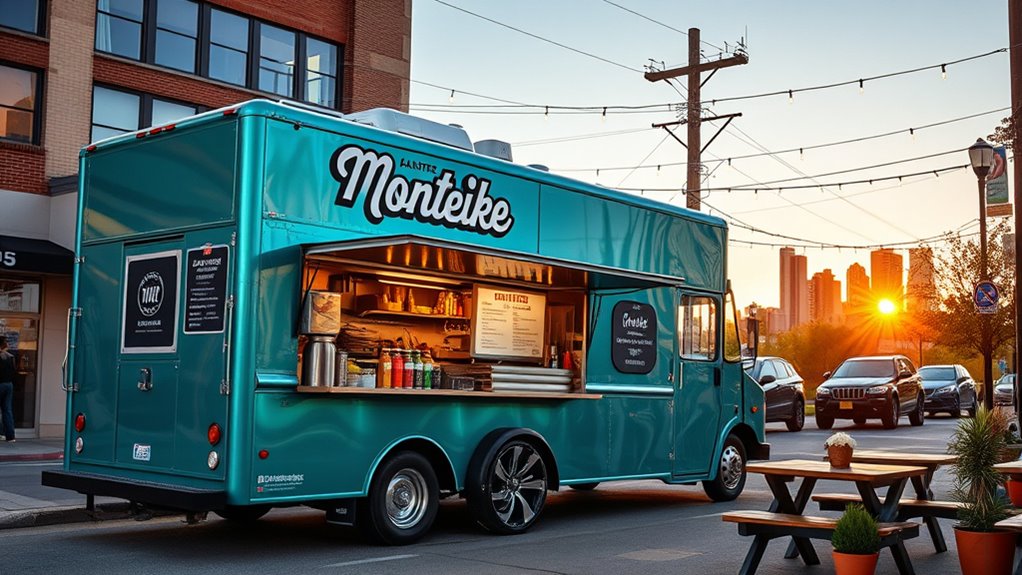
When setting up your base of operations, you’ll need to understand the shared kitchen licensing requirements in Minneapolis. Planning your custom kitchen layout carefully guarantees you meet health codes and optimize your workflow. Getting these details right now saves you headaches later as you start your food truck journey. Additionally, understanding the second trimester overview can help you plan your schedule and manage your energy levels effectively during the setup process.
Shared Kitchen Licensing Requirements
Setting up your food truck in Minneapolis requires obtaining the appropriate shared kitchen license to operate legally. To meet the licensing requirements, you need to find a certified shared kitchen that complies with local health codes. Here’s what to expect:
- Inspection: Your chosen shared kitchen must pass health and safety inspections to ensure it meets state sanitation standards.
- Documentation: You’ll need to submit proof of ownership, insurance, and licensing applications specific to shared kitchens.
- Training: Completing food safety training is often required to demonstrate your understanding of proper handling and hygiene.
Making sure these licensing requirements are met guarantees your shared kitchen is compliant, helping you avoid legal issues and get your Minneapolis food truck rolling smoothly.
Custom Kitchen Layout Planning
Designing your custom kitchen layout is a crucial step in establishing a functional and efficient food truck. With thoughtful layout optimization, you guarantee smooth workflow, safety, and compliance. Focus on maximizing space while minimizing movement, so your team works seamlessly. Consider your menu and how equipment will fit into your custom kitchen design—prioritizing accessibility and efficiency. Here’s a quick glimpse of key elements:
| Aspect | Importance |
|---|---|
| Equipment placement | Reduces prep time and boosts productivity |
| Storage solutions | Keeps ingredients accessible and organized |
| Workflow zones | Ensures smooth transitions between tasks |
| Safety considerations | Prevents accidents and maintains hygiene |
| Ventilation & lighting | Creates a safe, comfortable workspace |
Budgeting and Financing Your Food Truck
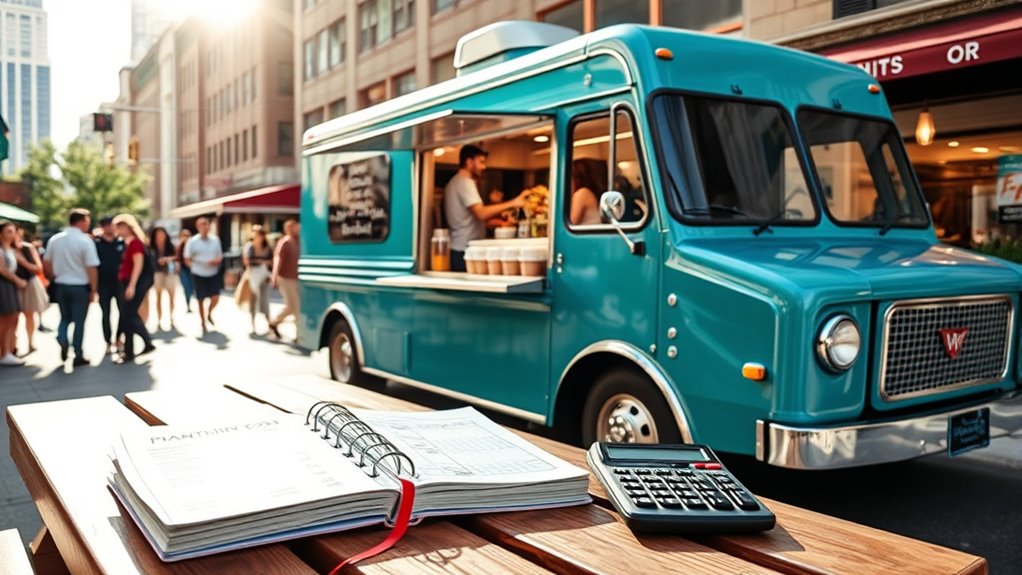
To get your food truck on the road, you’ll need to consider the initial purchase costs and how to finance them. Local small business grants can help ease some of the financial burden, but you also need to budget for insurance and legal requirements. Planning your finances carefully now sets you up for smoother operations later. Additionally, understanding AI-driven financial tools can help optimize your budget management and forecast expenses more accurately.
Initial Truck Purchase Costs
Purchasing a food truck is a significant investment that requires careful budgeting and financing. The initial truck costs vary depending on factors like size, condition, and customization. For example, you might spend:
- $20,000-$50,000 on a used truck with good fuel efficiency to keep operational costs low.
- $50,000-$100,000 for a new, fully customized truck with premium features and branding options.
- Additional costs for truck branding, which can range from $1,000 to $10,000, depending on the design complexity.
Local Small Business Grants
Securing funding through local small business grants can considerably ease the financial burden of launching your food truck. These grants support your efforts in building a strong food truck branding and expanding your presence via social media marketing. Minneapolis offers various programs for small businesses, so research grants like the Minnesota Small Business Relief Fund or local economic development initiatives. To increase your chances, prepare a compelling business plan and clearly outline how the grant will boost your visibility. Use the table below to compare key grant options:
| Grant Program | Focus Areas |
|---|---|
| MN Small Business Relief Fund | Startup costs, branding, marketing strategies |
| Minneapolis Small Business Grants | Community engagement, social media marketing |
Insurance Types and Legal Requirements
Understanding the insurance types and legal requirements is essential for effectively budgeting and financing your food truck. Proper insurance policies protect you from liabilities, while legal compliance ensures you avoid fines or shutdowns. Here are key steps to contemplate:
- Obtain general liability insurance to cover accidents and property damage.
- Secure vehicle insurance that meets Minnesota’s minimum coverage requirements.
- Comply with local permits and health regulations to stay legally operational.
Designing Your Menu and Pricing Strategy
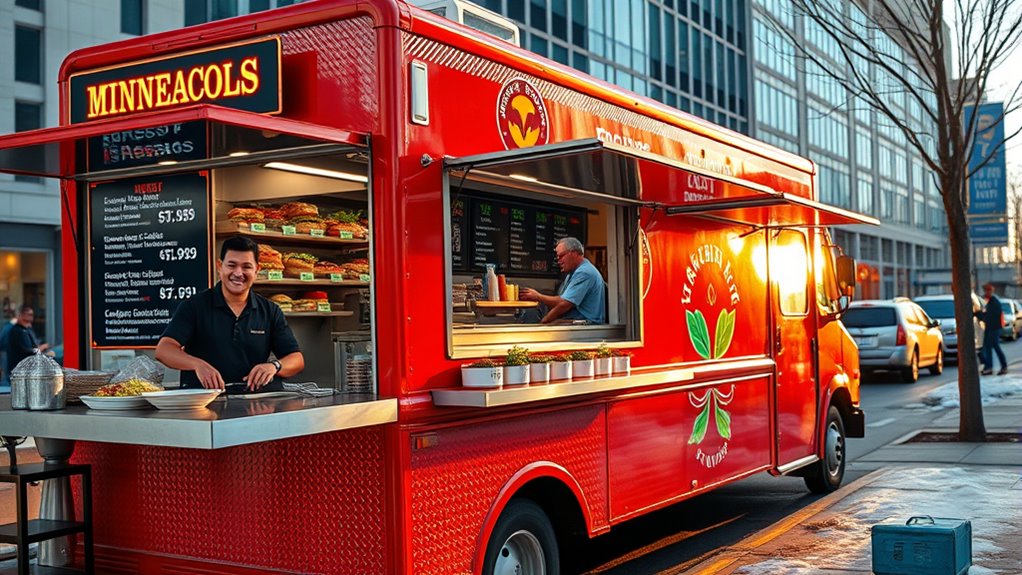
When designing your menu, focus on creating innovative dishes that showcase local ingredients to stand out. Calculate ingredient costs carefully to make certain your pricing covers expenses while remaining attractive to customers. Balancing creativity with cost management sets the foundation for a successful food truck strategy. Incorporating specialty ingredients such as unique teas or spices can also elevate your menu and appeal to a broader audience.
Innovative Dishes Inspired by Local Ingredients
To create innovative dishes inspired by local ingredients, you need to thoughtfully design your menu around the unique flavors available in Minneapolis. Focus on food presentation to highlight freshness and local produce, making each dish visually appealing. For recipe innovation, consider these steps:
- Incorporate seasonal ingredients like wild rice or maple syrup to craft signature dishes that reflect local flavors.
- Experiment with combining traditional recipes with modern twists to surprise your customers.
- Keep your menu flexible to adapt to ingredient availability and showcase the best of what Minneapolis offers.
Ingredient Cost Calculations
Calculating ingredient costs is essential for designing a menu that balances quality with profitability. You need to understand ingredient pricing to set realistic menu prices that cover your costs and generate profit. Start with a detailed cost analysis of each ingredient, including purchase price and portion size. This helps you determine the true cost per dish and identify high-cost items that may need adjustment. Keeping track of ingredient costs also allows you to compare suppliers and negotiate better prices. By regularly reviewing your cost analysis, you can make informed decisions about menu changes, portion sizes, and pricing strategies. Ultimately, accurate ingredient cost calculations guarantee your food truck remains financially sustainable while offering quality dishes to your customers.
Technology and Operations

You’ll want to incorporate wireless payment apps to make transactions quick and easy for customers. Using real-time stock tracking software helps you stay on top of inventory and avoid shortages. These technologies streamline your operations and keep your food truck running smoothly. Additionally, effective communication tools can help your team coordinate seamlessly during busy hours.
Wireless Payment App Integration
Have you ever wondered how seamless your food truck experience can be with wireless payment apps? Integrating contactless payments and mobile POS systems makes transactions faster and more convenient. Here’s what you’ll enjoy:
- Quick payments: Customers simply tap their cards or phones, reducing wait times.
- Improved efficiency: Mobile POS systems streamline order processing and checkout.
- Enhanced customer experience: Offering multiple payment options boosts satisfaction and loyalty.
Real-Time Stock Tracking Software
By integrating wireless payment apps, food trucks have already enhanced the customer checkout experience. Now, real-time stock tracking software takes your operations further by streamlining inventory management. With this technology, you can monitor your stock levels instantly, reducing waste and preventing shortages. It also improves supply chain coordination, allowing you to reorder ingredients before running out. This software provides accurate data, helping you make informed decisions quickly and efficiently. You’ll save time on manual tracking and avoid costly mistakes. Additionally, real-time updates ensure you’re always aware of your inventory status, enabling smoother daily operations. Implementing this system keeps your food truck agile, responsive, and better prepared to meet customer demand while maintaining high-quality service.
Marketing and Growing Your Presence
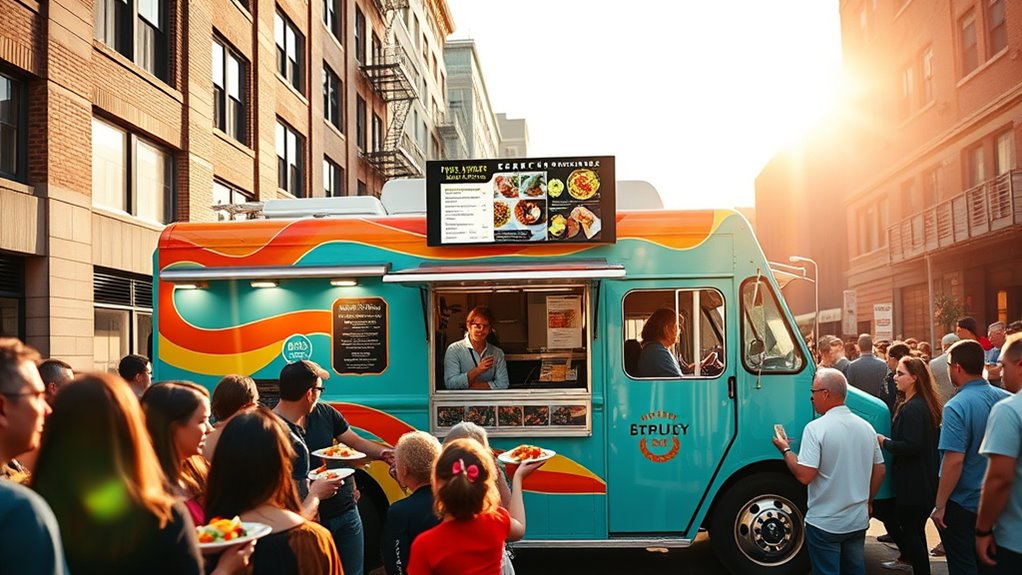
To grow your food truck’s presence in Minneapolis, focus on showcasing at popular local event venues where foot traffic is high. Building customer loyalty through programs like punch cards or rewards keeps people coming back. These strategies help increase visibility and turn first-time visitors into loyal customers.
Popular Local Event Venues
Looking for the best ways to boost your food truck’s visibility in Minneapolis? Focusing on popular local event venues can elevate your food truck branding and attract new customers. These venues often host large gatherings, festivals, and markets, perfect for event catering opportunities. Consider these top spots:
- Minneapolis Convention Center – a hub for conferences and trade shows, ideal for business catering.
- Lyndale Park Gardens – popular for summer festivals and outdoor events, great for brand exposure.
- Uptown Minneapolis – bustling with street fairs and concerts, perfect for reaching diverse crowds.
Customer Loyalty Programs
Implementing a customer loyalty program is one of the most effective ways to grow your food truck’s presence in Minneapolis. By rewarding repeat customers with loyalty incentives, you encourage ongoing customer engagement. Consider offering punch cards, digital rewards, or exclusive discounts to motivate patrons to return. These programs help build a strong connection between you and your customers, making them more likely to recommend your food truck to others. Keep the rewards simple and valuable to maximize participation. Promoting your loyalty program through social media and at your truck ensures more customers learn about the benefits. Over time, this strategy boosts customer retention, enhances your reputation, and fosters steady growth in a competitive Minneapolis food scene.
Local Networking Opportunities and Support
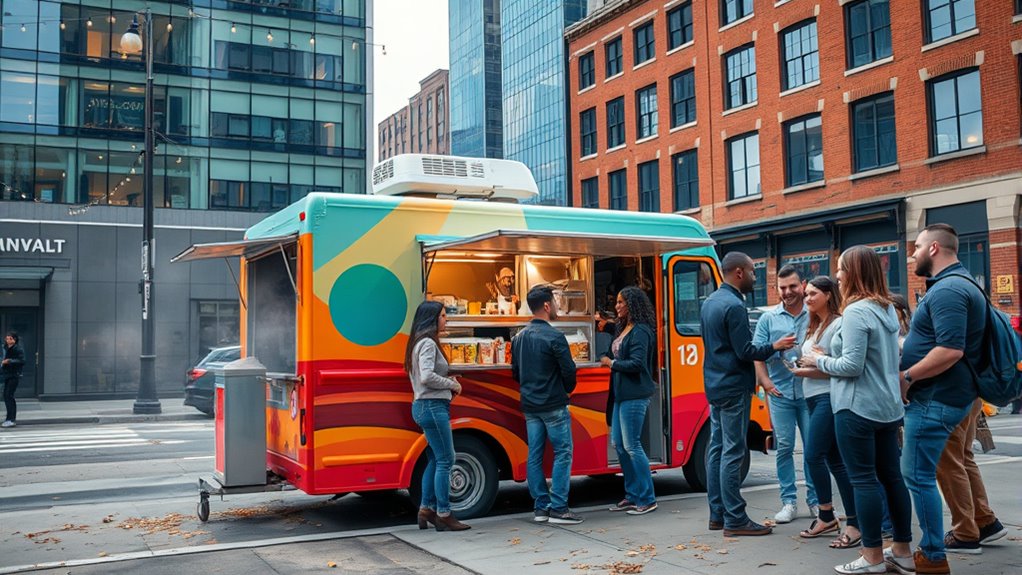
Networking opportunities and support systems are essential for food truck owners in Minneapolis to thrive. Connecting with local supplier networks ensures you get quality ingredients at competitive prices, helping your business stay cost-effective. Joining community business groups opens doors to partnerships, shared resources, and valuable advice. To get started, consider these steps:
- Attend local food truck meetups and events to build relationships with other vendors.
- Engage with community business groups like the Minneapolis Small Business Association to access mentorship and resources.
- Collaborate with local suppliers through networks that focus on fresh, regional ingredients to strengthen your supply chain.
These connections boost your visibility, reduce costs, and provide guidance, giving your food truck a solid foundation in Minneapolis’s vibrant food scene.
Frequently Asked Questions
What Are the Most Popular Food Truck Cuisines in Minneapolis?
You’ll find that food truck trends in Minneapolis highlight popular street foods like gourmet tacos, Korean BBQ, and inventive sandwiches. These cuisines attract big crowds because they offer unique flavors and quick bites, making them a hit among locals and tourists alike. To succeed, focus on these trending dishes, stay fresh with your menu, and keep up with evolving food truck trends that emphasize quality, originality, and local ingredients.
How Can I Find Reliable Food Truck Suppliers Locally?
You can find reliable local food truck suppliers in Minneapolis by visiting farmers’ markets and food expos to connect with local vendors. Build strong supplier relationships by asking for recommendations, checking online reviews, and visiting suppliers in person. Focus on local sourcing to guarantee freshness and quality. Establish consistent communication to foster trust, and consider partnering with multiple suppliers to diversify your sourcing and avoid disruptions.
Are There Specific Health Regulations Unique to Minneapolis?
Yes, Minneapolis has specific health regulations you need to follow. You’ll need to pass local health inspections that guarantee your truck meets food safety standards, like proper sanitation, safe food storage, and temperature controls. The Minnesota Department of Health oversees these regulations, so it’s essential to stay updated on any changes. Regular inspections are mandatory, and compliance helps you avoid fines or shutdowns, ensuring your food truck operates smoothly.
What Insurance Coverage Is Recommended for Food Trucks?
Think of insurance as your food truck’s safety net. You’ll need liability coverage to protect against accidents and damage, and insurance requirements vary by city. For example, when I started, I found that all-encompassing coverage saved me from big surprises after a minor collision. It’s wise to get general liability, vehicle insurance, and possibly workers’ compensation if you hire staff. Protect your business with the right insurance coverage to keep serving confidently.
How Do I Handle Parking Permits and City Restrictions?
You should start by researching the parking permit process through Minneapolis’s city website or local offices, ensuring you understand all requirements. Follow the city restriction guidelines carefully to avoid fines or violations. Apply for permits well in advance, gather necessary documents, and stay updated on any changes to regulations. Regularly check for updates to maintain compliance and secure prime spots for your food truck’s success.
Conclusion
Starting a food truck in Minneapolis is an exciting venture, especially with the city hosting over 7,000 food trucks nationwide. By crafting a solid business plan, understanding local rules, and connecting with the community, you set yourself up for success. Keep innovating your menu and leveraging social media to grow your presence. With Minneapolis’s vibrant food scene, your truck can become a favorite—so get started and turn your culinary dreams into reality!
